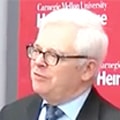Personal Mention

Jessica Hodgins, professor of computer science and robotics, has received the highest honor in computer graphics. The Association for Computing Machinery's Special Interest Group on Computer Graphics and Interactive Techniques (ACM SIGGRAPH) has been named her the 2017 recipient of its Steven Anson Coons Award for Outstanding Creative Contributions to Computer Graphics. Hodgins was selected in recognition of her foundational work in character animation, her support and cultivation of emerging researchers, her extensive volunteer service to the computer graphics community, her leadership and career-spanning achievement. A pioneer in the use of physical simulation and control as a means to produce character animation, Hodgins has been passionately involved in computer graphics for most of her career. She played an important role in developing library-based control, such as motion graphs, both for animated characters and for robotics. She also worked on how both animated characters and robots can move in expressive ways — an important ingredient in both entertainment and human-robot interaction. Find out more.
 Joseph S. Hezir, the U.S. Department of Energy’s (DOE) former chief financial officer, joined Carnegie Mellon’s Wilton E. Scott Institute for Energy Innovation as professor of the practice on Aug. 1. Hezir, who earned degrees in chemical engineering and public policy from Carnegie Mellon, will assist the Scott Institute’s leadership team in strategic planning, including developing objectives, strategies and implementation plans. “Joe has a highly successful track record working in government, academia and the private sector,” said Scott Institute Director Jay Whitacre. “His expertise will help position the Scott Institute in a leadership role in areas of high-impact innovation and further foster the Institute’s growth and prominence.” Hezir also will guest lecture throughout campus and assist in developing new policy oriented publications that will enhance the understanding of policymakers and other stakeholders to the value of research and analysis developed at his alma mater. Find out more.
Joseph S. Hezir, the U.S. Department of Energy’s (DOE) former chief financial officer, joined Carnegie Mellon’s Wilton E. Scott Institute for Energy Innovation as professor of the practice on Aug. 1. Hezir, who earned degrees in chemical engineering and public policy from Carnegie Mellon, will assist the Scott Institute’s leadership team in strategic planning, including developing objectives, strategies and implementation plans. “Joe has a highly successful track record working in government, academia and the private sector,” said Scott Institute Director Jay Whitacre. “His expertise will help position the Scott Institute in a leadership role in areas of high-impact innovation and further foster the Institute’s growth and prominence.” Hezir also will guest lecture throughout campus and assist in developing new policy oriented publications that will enhance the understanding of policymakers and other stakeholders to the value of research and analysis developed at his alma mater. Find out more.
 Electrical and Computer Engineering Professor Pulkit Grover recently presented a tutorial on information theory at the IEEE International Symposium in Aachen, Germany. Grover and Penn State Assistant Professor Viveck Cadambe discussed resilient parallel computing for Big Data processing, such as machine learning for neuroscience and solving differential equations for protein folding and molecular dynamics. Students in Grover’s lab, particularly Yaoqing Yang and Sanghamitra Dutta, have led work in this new field. Grover said resilient tools are necessary because as data dimensions explode, parallel computing has emerged as a natural solution. New techniques from resilient communication systems have been introduced into computational systems to make up for slow processors that slow down the entire processing.
Electrical and Computer Engineering Professor Pulkit Grover recently presented a tutorial on information theory at the IEEE International Symposium in Aachen, Germany. Grover and Penn State Assistant Professor Viveck Cadambe discussed resilient parallel computing for Big Data processing, such as machine learning for neuroscience and solving differential equations for protein folding and molecular dynamics. Students in Grover’s lab, particularly Yaoqing Yang and Sanghamitra Dutta, have led work in this new field. Grover said resilient tools are necessary because as data dimensions explode, parallel computing has emerged as a natural solution. New techniques from resilient communication systems have been introduced into computational systems to make up for slow processors that slow down the entire processing.
